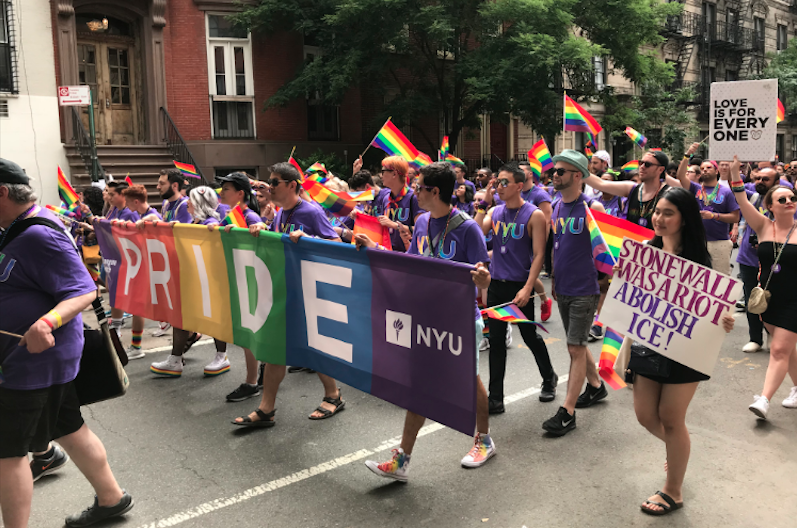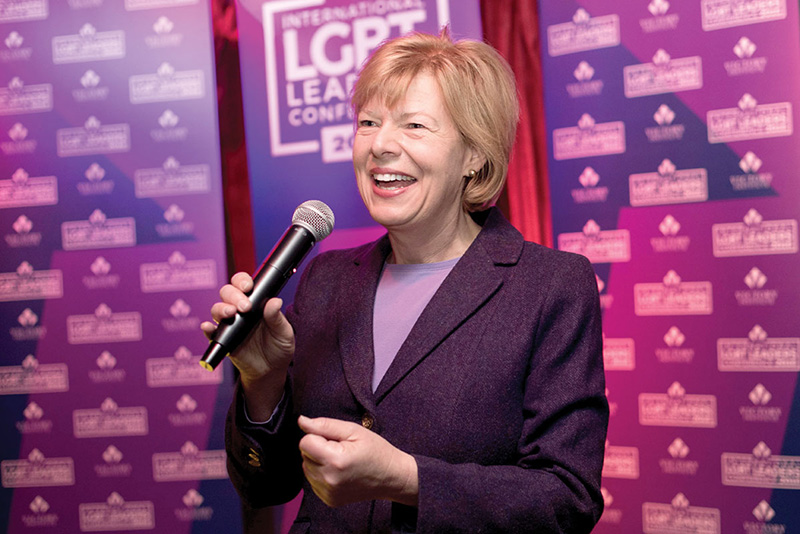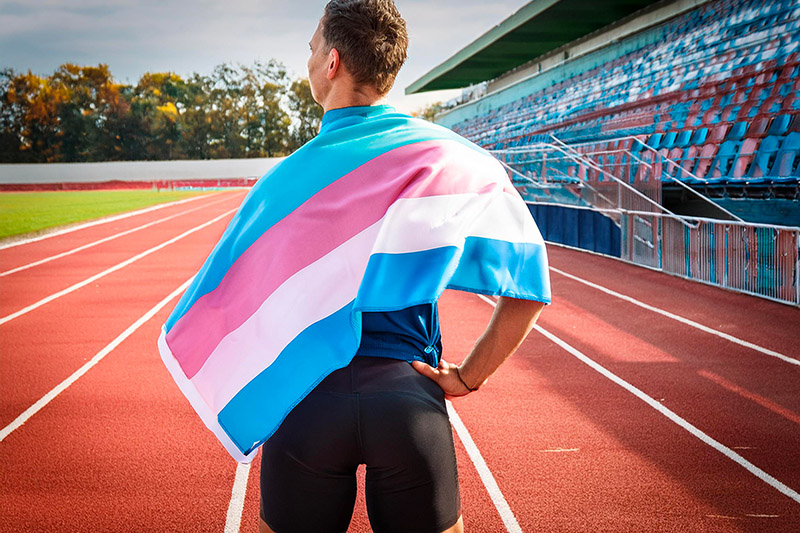LGBTQ Victory Institute’s Annise Parker predicts a “rainbow tsunami” in 2020
Parker says there are many more LGBTQ people who "could and should" be running for elective office

“I am absolutely convinced that the ‘rainbow wave’ we saw last year and this year is going to be even bigger next year,” says Annise Parker, the president and CEO of the LGBTQ Victory Institute, which helps recruit and train LGBTQ people to run for elected office.
“Not as many people run in the odd-numbered years, it’s down-ballot races,” concedes Parker. “But we saw as much of an increase in down-ballot races this year as we saw in the partisan races in 2018, and I’m expecting an absolute ‘Rainbow Tsunami’ as part of what I fully expect to be a huge blue wave sweeping across America.”
Asked why the number of out LGBTQ candidates running hasn’t abated, Parker says that the conditions that created the first ‘rainbow wave’ in 2018 haven’t changed, which only encourages larger numbers of LGBTQ people who are concerned about the direction of the country to become more politically engaged.
“The Trump administration and right-wing legislators across the country have been trying to attack us in various ways, particularly the trans community,” says Parker, pointing to legislation like so-called ‘religious freedom’ bills, exemptions allowing child placement agencies to discriminate against same-sex parents, anti-transgender ‘bathroom bills,’ and the trans military ban as examples.
“I think what happened in the United States is a lot of us thought we reached the point where we were in a pretty good place, and then the Trump administration and the far right started coming after us, and we see that our rights are not as secure as we thought they were, and that scared a lot of folks,” says Parker.
“And that’s part of the reason that I suggest the ‘rainbow wave’ stood up, because we see that we may have marriage, but we could lose our job; we may have marriage, but in a certain state, we may not be able to adopt children; and our rights are at risk.”
For the Victory Institute, which endorses out LGBTQ (and pro-choice) Republicans and Democrats alike, there are benefits to LGBTQ candidates running for office, even if they’re not ultimately victorious.
“There are no losers, even if we don’t win a race, because it’s one more opportunity to put another face of our forward and an opportunity for folks to get to know us and hopefully change minds,” says Parker.
As an example, she points to presidential candidate Pete Buttigieg, whom the Victory Institute’s sister organization, the LGBTQ Victory Fund, officially endorsed earlier this year.
“Every day he’s in the race is a good day for our community,” says Parker. “Whether or not individual members of our community support him as a candidate, he is changing hearts and minds. He is providing an example of what a gay man can be and he is being beamed into people’s living rooms and having conversations that people respond to. He is breaking new ground for all the candidates are going to follow after him, whether or not he becomes president.”
But if candidates do win, there are a number of tangible benefits, she argues. For instance, LGBTQ candidates may introduce pro-LGBTQ legislation, but their presence in a legislative body can help defend the community from anti-LGBTQ attacks.
“What we’ve seen over and over again is that one person in a legislative body, one LGBTQ member, can’t really affect a lot of change, but [their presence] slows down the passage of anti-LGBTQ legislation. Because you’ve got to look somebody in the eye, you’ve got to sit next to him in a committee, you’ve got to face your prejudice,” says Parker. She notes that experience shows that once three or more LGBTQ people are elected to a body, there’s a significant drop in the amount of anti-LGBTQ legislation that passes.
According to Parker, we’re a long way from scraping the bottom of the barrel when it comes to seeking out qualified LGBTQ people to run for office.
“Current polling says that we may be four and a half percent of the population,” she notes. “If we’re four and a half percent of the population, then there should be 23,000 out LGBTQ elected officials at every level of government across the United States. There’s only about 760 of us. So there’s a lot more of us out there who could and should be running, and there’s a lot of current elected officials who could or should be coming out, and we’re going to help them do that.”

From Nov. 14-16, the Victory Institute is sponsoring the International LGBTQ Leaders Conference, which brings together elected LGBTQ officials from all over the world, as well as campaign strategists and others who work in the political arena, to address specific issues in various workshops or plenaries — the bulk of which occur on Friday, Nov. 15 and Saturday, Nov. 16.
New this year is a panel, scheduled for Friday morning at 10 a.m., on indigenous populations, which will feature U.S. Reps. Sharice Davids (D-Kansas) and Deb Haaland (D-N.M.), the first indigenous women to be elected to the U.S. House of Representatives. The panel will feature several other leaders who will talk about their personal experiences being queer and indigenous, and highlighting issues like inequality, stigma, and lack of access to resources that disproportionately affect indigenous populations.
Another panel, held every few years, deals with the role of the political spouse and what that entails, as well as dealing with breakups and the complications that being in politics may bring to one’s personal life.
Parker notes that Victory Institute’s training for candidates considering running for office is trying to adjust to the times and changes in technology, such as the consequences that could arise from a candidate’s use of dating apps.
“In an era where there’s a camera and a microphone everywhere we go, it is something that we’re all going to have to face. …[Y]ou have to be aware that every picture you take and put out in social media can come back to haunt you,” she says, referring to “unfortunate” incidents like the release of compromising photos of former Congresswoman Katie Hill as “revenge porn,” or a 19-year-old Texas councilmember who was recalled by voters after his Grindr nudes were leaked to the public.
“I don’t think [situations like those] should discourage anybody from running, but I think you should prepare yourself for it,” says Parker. “What we tell anybody who jumps into a political race is the first thing you should do is investigate yourself: what can be used against you and how do you neutralize it?”
But, she adds: “I do think that over time this issue will become less relevant because, under a certain age, there’s just so much more of it. I think, over time, we’ll find a balance point, because young people are going to be less interested in shaming somebody for the release of these kinds of pictures.”
Asked about her message to those attending the International LGBTQ Leaders Conference, Parker says the focus will be on staying true to Victory’s mission of changing public views on LGBTQ leaders by electing more of them to office.
“We’re being the change we want to see in the world and it’s exciting, but we can’t let our guard down,” she says. “We are a long way from being fully equal here in the United States, and we’re an even longer way from being fully equal around the globe. So there’s still a lot of work to do. We can celebrate the victories, but we have to double down on the work, and we’re going to be saying that over and over again.”
The International LGBTQ Leaders Conference runs through Saturday, Nov. 16 at the JW Marriott Washington, 1331 Pennsylvania Ave. NW. For more information, visit lgbtqleaders.org or check out the Victory Institute’s Facebook page at www.facebook.com/victoryinst.
Read more:
Georgia’s Republican House Speaker reiterates opposition to anti-LGBTQ “religious freedom” bills
FBI report shows number of anti-LGBTQ hate crimes in U.S. rose in 2018
Support Metro Weekly’s Journalism
These are challenging times for news organizations. And yet it’s crucial we stay active and provide vital resources and information to both our local readers and the world. So won’t you please take a moment and consider supporting Metro Weekly with a membership? For as little as $5 a month, you can help ensure Metro Weekly magazine and MetroWeekly.com remain free, viable resources as we provide the best, most diverse, culturally-resonant LGBTQ coverage in both the D.C. region and around the world. Memberships come with exclusive perks and discounts, your own personal digital delivery of each week’s magazine (and an archive), access to our Member's Lounge when it launches this fall, and exclusive members-only items like Metro Weekly Membership Mugs and Tote Bags! Check out all our membership levels here and please join us today!





























You must be logged in to post a comment.